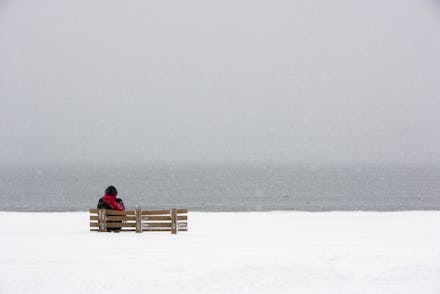A Suicide Spike Around the Holidays? Experts Say It's a Perennial Myth

The idea that there's an increase in suicide rates around the holidays is closer to the stuff of urban legends, but for years it's been considered fact.
"It's been an ongoing idea for as long as I've been alive," said New York-based psychotherapist Joshua Hooberman, "and we haven't seen a lot of uptake in actual suicide rates."
According to the Centers for Disease Control and Prevention's website, its "National Center for Health Statistics reports that the suicide rate is, in fact, the lowest in December. ... This pattern has not changed in recent years. The holiday suicide myth supports misinformation about suicide that might ultimately hamper prevention efforts." Between 2009 and 2010, the CDC reported that 50% of articles erroneously stated otherwise.
While people often point to an onslaught of family drama as a point of exacerbation for those with depression, the family situation isn't all bad for everyone.
"In general, intense family time can bring up the remembrance of family conflicts and losses," Hooberman explained. "[But] the holidays and family connection are bolstering and really helpful for a lot of people — a fact that maybe gets lost in the 'holidays are stressful' narrative."
At the same time, Hooberman noted that people who have relatives who have committed suicide are more likely to do it themselves, or at least consider it as an option, because "it is a familiar idea." This caveat shines a light on one of the biggest misconceptions surrounding suicide and depression.
"The act of suicide," he said, "takes some energy and planning, and sometimes people who are really depressed are so depleted of energy that they cannot muster the ability to make a suicide attempt. In fact, sometimes suicide attempts occur at times when there is more activation."
And underlying the entire "suicide and holiday" fable is the fact that the "activation" Hooberman speaks of is more likely to take place during the warmer months. For this reason, he says, the true spike in suicide occurs not during the chilly holiday months, but when temperatures rise. "For people who are clinically depressed, they may see the activity in the world around spring and summer and realize that they are still depressed and therefore feel even more isolated and hopeless," Hooberman said.
The holiday suicide myth is one that's troubled us for more than a century. "The pattern of spring being a heightened risk for suicide has been long known," according to Scientific American. "It was first observed in 1897 by the sociologist Emile Durkheim, who described suicides in Europe reaching 'its maximum during the fine season, when nature is most smiling and the temperature milder.'"
Even the most heartwarming aspects of the season aren't necessarily heartwarming at all — like the onslaught of It's a Wonderful Life broadcasts. George Bailey's contemplation of suicide at Christmas, the article says, "is more off trend than on." But despite longtime efforts to convince the public otherwise, the myth gets a renewal each December, casting a shadow over the waning days of the year.
h/t the Atlantic